Overview
When considering senior care homes, it’s essential to focus on factors that truly matter to you and your loved ones. The following elements are crucial:
- Personalized support
- Proximity to family
- Diverse service options
- Cost analysis
- Caregiver qualifications
- Resident engagement
- Understanding facility policies
By prioritizing these aspects, you can significantly enhance the quality of life for seniors. Tailored care and strong family connections lead to improved emotional well-being and satisfaction in their living environment.
Imagine how comforting it is to know that your loved one is receiving care that is not just adequate, but truly personalized. This level of attention can make all the difference, fostering a nurturing atmosphere where seniors feel valued and understood. As you explore options, consider how each facility aligns with these important factors.
In addition, engaging with the community and maintaining family ties can greatly enrich the lives of seniors. Your involvement and support can lead to a more fulfilling experience for them. Remember, we’re here for you, and your comfort is our priority. Take the time to ask questions and seek out the best options that resonate with your family’s needs.
Introduction
Navigating the world of senior care can feel overwhelming for families who are responsible for ensuring their loved ones receive the best possible support. As the aging population continues to grow, understanding the nuances of senior living options becomes increasingly important. Each decision, from personalized care plans that prioritize individual needs to the significance of being close to family, plays a vital role in enhancing the quality of life for seniors.
This comprehensive guide aims to address your concerns and provide essential considerations to help you through this journey. We will explore how to evaluate care options, understand costs, and ensure caregiver compatibility. Our goal is to empower families like yours to make informed choices that foster well-being and dignity in the lives of your elderly relatives. Remember, you are not alone in this process; we’re here for you every step of the way.
Best Care Nurses Registry: Prioritize Personalized Care in Senior Living Choices
Best Care Nurses Registry stands out by prioritizing individualized support in senior care homes. This tailored approach ensures that each resident’s unique needs and preferences are addressed, fostering a more comfortable and enriching living experience. Customized treatment plans are essential for addressing particular health issues and adapting to lifestyle preferences, which are vital for maintaining the dignity and autonomy of seniors.
Studies show that tailored support not only improves health outcomes but also boosts resident satisfaction, resulting in a profound sense of belonging. For instance, structured daily routines and a nurturing environment in assisted living communities have been shown to alleviate feelings of depression and anxiety among residents. This highlights the importance of creating a supportive atmosphere that promotes overall well-being.
Home health care services provided by Best Care Nurses Registry are less expensive, more convenient, and just as effective as care received in hospitals or nursing facilities. This service addresses the safety concerns of households, alleviating fears about leaving loved ones home alone. Furthermore, it provides emotional support, helping to reduce loneliness and confusion that older adults may encounter. Best Care Nurses Registry also assists households with long-term insurance claims, ensuring clients receive the essential support while preserving their quality of life. By focusing on the unique needs of individuals, caregivers can build trust and rapport, creating a supportive atmosphere that promotes overall well-being. This dedication to individualized service, along with adaptable support options and suitable caregiver matches in senior care homes, is crucial as the healthcare landscape evolves, ensuring that older adults receive the compassionate assistance they deserve.
When evaluating living options in senior care homes for the elderly, it is vital to inquire with potential providers about their approach to personalized support and how they customize services to meet individual needs. To explore how Best Care Nurses Registry can support your loved ones, call (888) 203-2529 today.
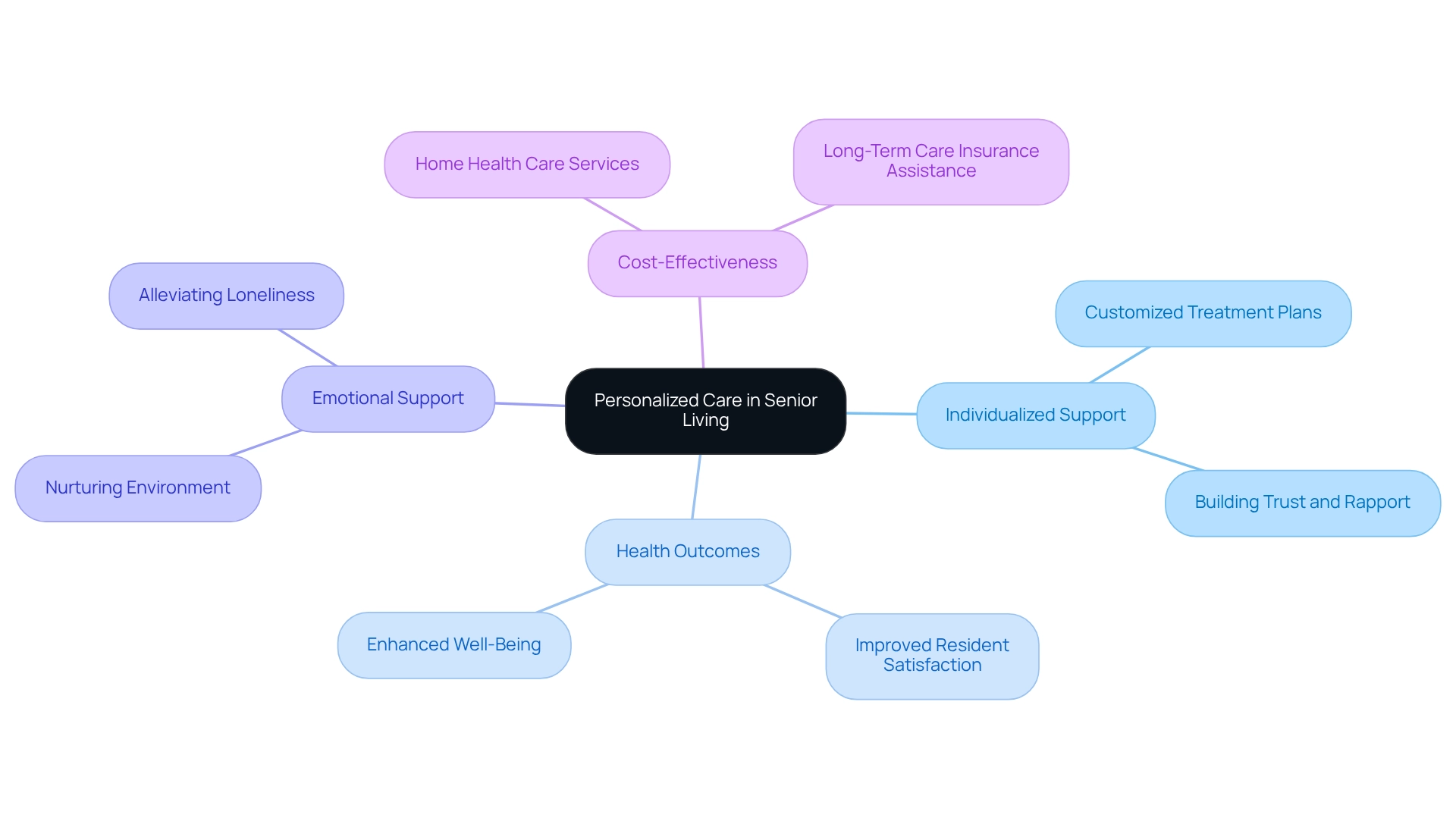
Consider Proximity: Choose Senior Care Homes Close to Family and Friends
Choosing senior care homes near relatives and companions can significantly enhance a resident’s quality of life. Regular visits from cherished individuals help reduce feelings of loneliness and isolation, which are common among elderly individuals in senior care homes. These interactions foster emotional support and a sense of belonging, both vital for maintaining mental health in senior care homes. Research indicates that engagement from relatives in senior care homes not only boosts older adults’ emotional well-being but also encourages participation in activities, thereby enriching their daily experiences. The bond of family often influences transitions between parents and children, underscoring the importance of these connections in decision-making.
Furthermore, being close to loved ones in senior care homes promotes open conversations about support needs and preferences, ensuring that seniors feel valued and understood in their new environment. This connection can lead to greater satisfaction with support services in senior care homes, as family members become more involved in the decision-making process. Initiatives like the Partners in Caregiving project have shown that strengthening ties between relatives and care staff can significantly reduce conflicts and enhance overall satisfaction. By prioritizing closeness to family, seniors living in senior care homes can enjoy a more fulfilling and supportive living experience.
At Best Care Nurses Registry, we understand the importance of personalized support. Our process begins with a call to discuss your needs, followed by collaboration with your loved one’s physician to create a customized support plan. We then refer compassionate caregivers who align with your loved ones’ preferences. We are also proud to offer pet-friendly options, ensuring that your loved ones can enjoy the companionship of their furry friends. As Cindy Longfellow wisely states, ‘See how our tailored support and engaging lifestyle can enhance your loved one’s life,’ which highlights the essential role of family involvement in senior care homes.
We’re here for you—CALL (888) 203-2529 to schedule a call and discuss your needs.
Evaluate Services: Assess the Range of Care Options Available in Senior Homes
When choosing senior care homes, it’s essential to consider the variety of services that are available. Many senior care homes provide different levels of support, including assistance with daily activities, medical care, and specialized programs for conditions like dementia. Did you know that around 70% of people aged 65 and older will require some form of long-term assistance during their lifetime? This statistic highlights the importance of having extensive service options.
Facilities that provide a diverse range of services can adapt more effectively to changes in health status, ensuring continuity of support as needs evolve. For example, the median cost of a one-bedroom assisted living apartment reached $4,803 in 2023, illustrating the financial considerations families must navigate when seeking assistance. As senior care homes anticipate a rise in residents over the next 10 to 20 years, the demand for spaces that can adjust to various support requirements will only grow. It’s crucial for families to take these aspects into account.
Expert opinions underscore the importance of varied support services available in senior care homes for seniors. Matthew Clem, a registered nurse, states, “more than half of assisted living residents need help with walking and bathing,” which emphasizes the necessity for facilities to provide tailored support. Furthermore, the role of CNA/HHA caregiver services is vital; they assist with personal hygiene and mobility while also offering emotional support, helping to alleviate feelings of loneliness and depression. Families should look for senior care homes that not only meet current needs but also have the ability to adapt services as health conditions change, ensuring their loved ones receive appropriate support throughout their aging journey.
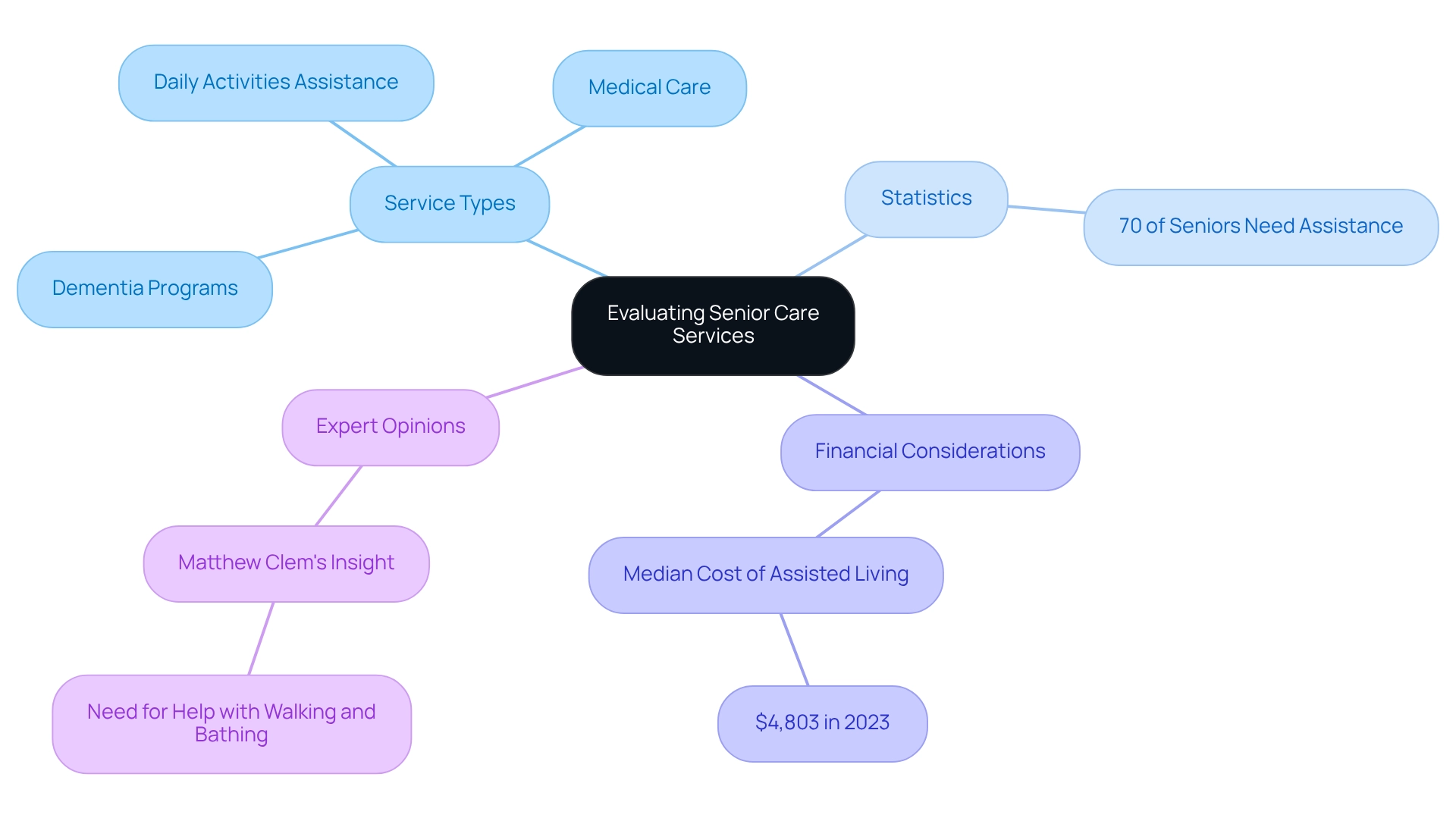
Understand Costs: Analyze Pricing Structures and Insurance Coverage for Senior Care
Understanding the expenses associated with senior care homes is vital for families seeking the best options for their loved ones. Pricing structures can vary widely among facilities; some may offer all-inclusive rates, while others use an a la carte model for services. For example, the median move-in or community fee for assisted living is around $2,500, underscoring the importance of careful financial planning.
Families should take the time to analyze these costs in relation to the services provided, ensuring they meet their loved ones’ needs. Exploring insurance coverage options, especially long-term support insurance, is essential, as it can significantly alleviate financial pressures. At Best Care Nurses Registry, we accept most long-term support insurances directly on your behalf, simplifying the payment process. Most carriers require a form called an assignment of benefits (AOB) to be completed by the policyholder, allowing you to direct the carrier to pay us directly. We manage all necessary paperwork and can often initiate services promptly, minimizing out-of-pocket expenses unless your policy includes an elimination period.
It’s important to recognize that Medicare does not assist with activities of daily living, which private duty caregivers typically provide. Effective Medicaid planning can also offer considerable financial assistance and access to essential support services, enhancing the quality of life for elderly individuals. This planning is crucial, as it helps families navigate the complexities of financing senior care homes. Furthermore, data from 2022 shows that satisfaction with the quality of long-term assistance among U.S. adults is significant, highlighting the importance of informed decision-making. Interestingly, considering the overall value of assisted living may reveal it to be more affordable than expected, encouraging families to explore options they might otherwise overlook. By understanding the pricing frameworks and available insurance options, families can make sustainable choices that ensure vital support for their loved ones without facing overwhelming financial burdens. We invite you to reach out to Best Care Nurses Registry today to explore your long-term assistance insurance options and begin planning for your loved one’s care.
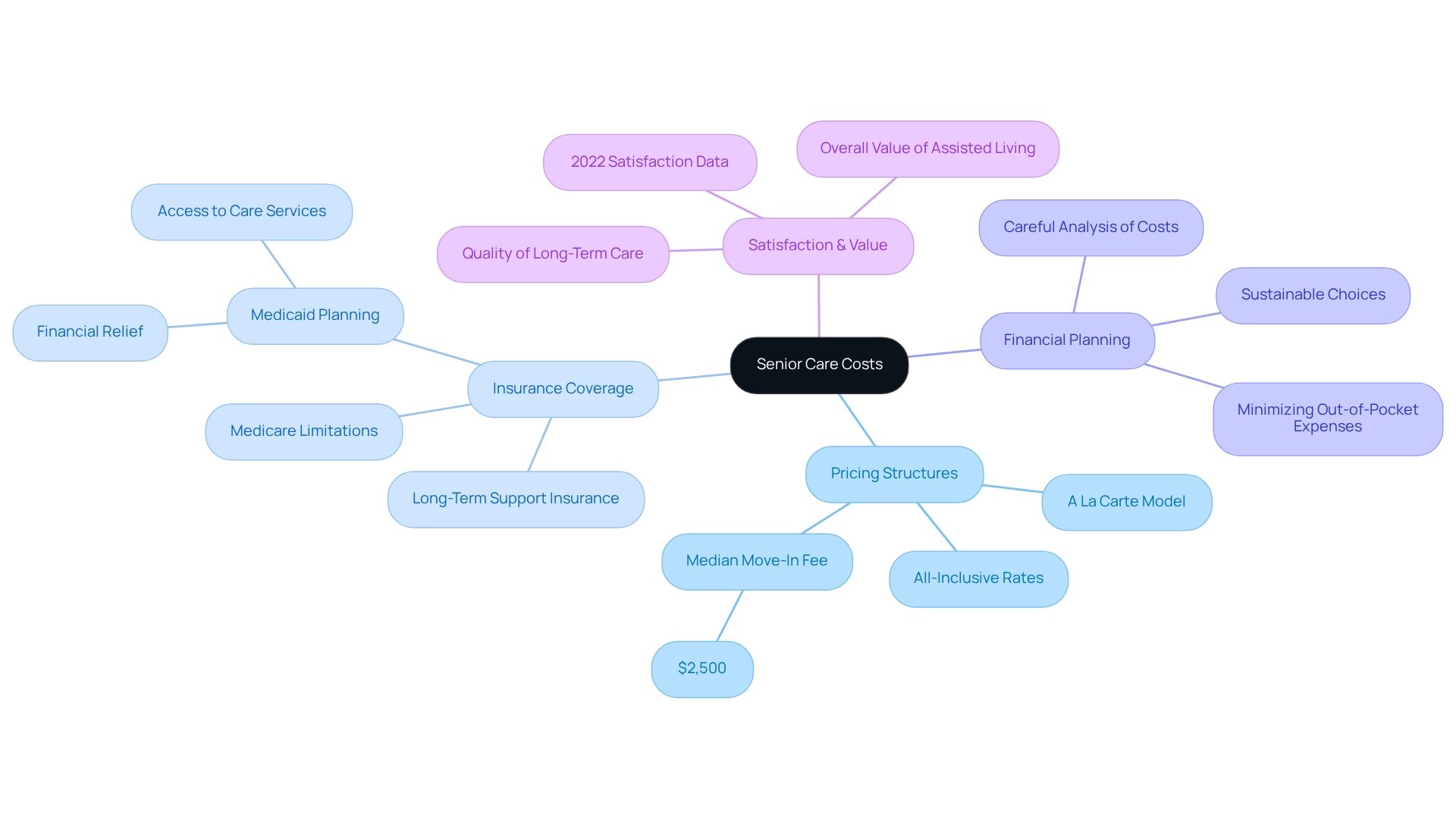
Conduct Visits: Tour Senior Care Facilities to Gauge Atmosphere and Care Quality
Visiting senior care homes is an essential part of the decision-making journey for families. These tours provide an opportunity to assess the atmosphere, cleanliness, and overall environment of potential homes. Observing staff interactions with residents is vital, as it reflects the quality of care and engagement levels. Families should pay close attention to how residents are treated in senior care homes, noting their happiness and well-being—key indicators of a supportive environment. During visits to senior care homes, families can ask important questions and gather vital information that aids in making informed decisions about the best living arrangements for their loved ones. Research shows that residents in senior care homes who undergo thorough assessments during facility visits report higher satisfaction levels, highlighting the significance of these evaluations. Additionally, senior support advocates emphasize that taking comprehensive notes and asking specific questions during visits is crucial for effectively evaluating service quality.
To determine if an elderly family member needs CNA/HHA caregiver assistance, families should assess their ability to perform daily tasks and their overall health condition. Signs that may indicate the need for these services include challenges with personal hygiene, dressing, cooking, cleaning, or managing medications. Regular communication with caregivers and the home support agency is essential to ensure high-quality assistance. Families are encouraged to connect with their loved ones, discussing their experiences and concerns, requesting regular updates from caregivers, and considering surprise visits to observe the support being provided.
For instance, a case study on managing fatigue in older adults underscores the importance of personalized support plans, which can be better understood through direct observation of facility practices. By implementing tailored approaches, facilities can significantly enhance recovery times and the overall quality of life for residents. Therefore, families should approach site visits with a checklist of observations, ensuring they thoroughly evaluate service quality and select a residence that meets their loved ones’ needs. Moreover, considering the average life expectancy of 76.4 years for women and 81.2 years for men, the importance of high-quality support in senior care homes cannot be overstated. Families in cities like Miami, Fort Lauderdale, and Boca Raton should also be mindful of financial aspects, such as affordable rent levels and supportive services, when exploring their options. This comprehensive approach will ensure that families make well-rounded choices that prioritize both service quality and financial feasibility.
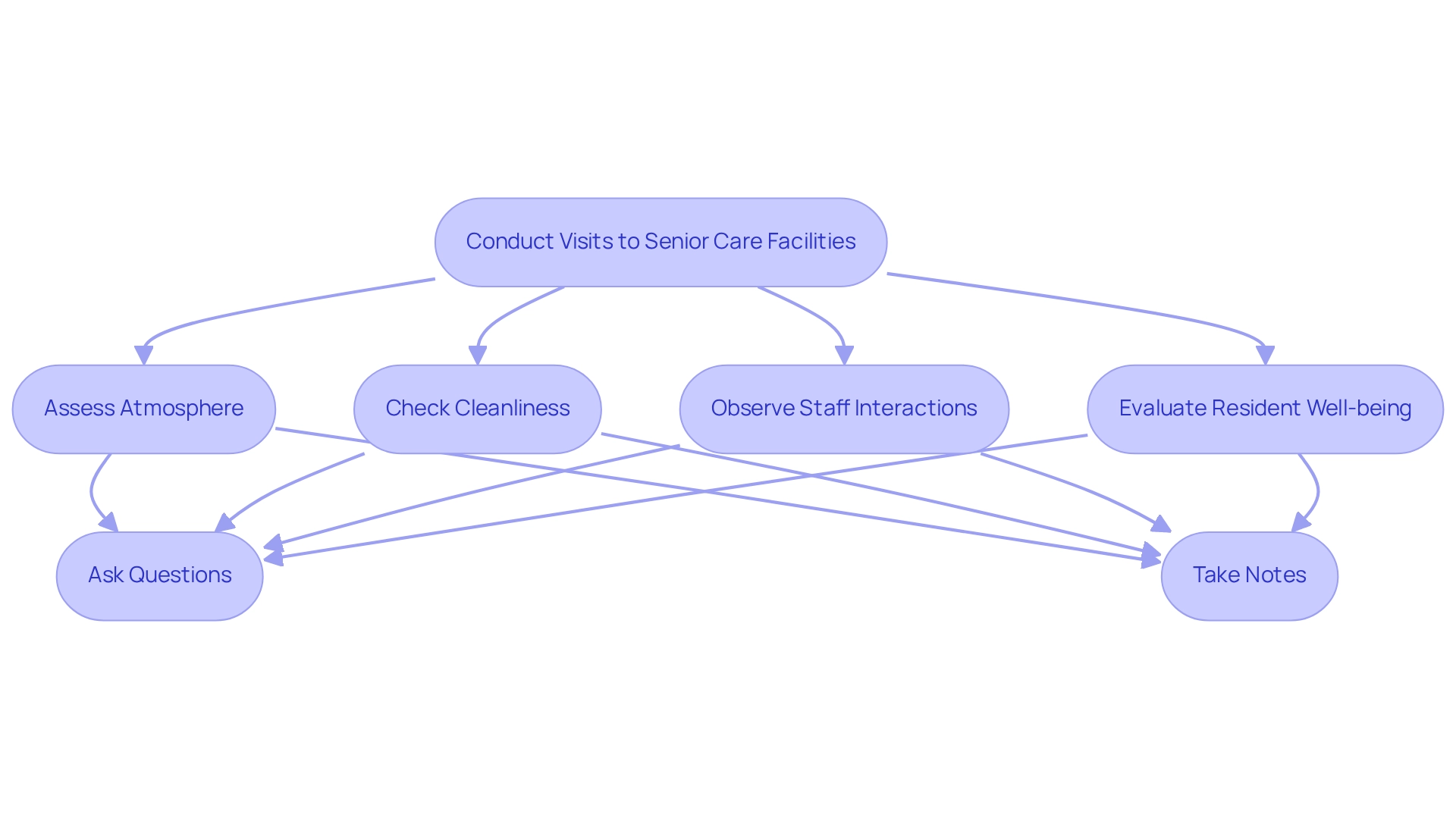
Check Staff Credentials: Ensure Caregivers Are Qualified and Trained for Senior Care
Confirming the qualifications of caregivers is crucial when choosing senior care homes. Families, understandably concerned about their loved ones, should actively seek information about the qualifications, training, and experience of the personnel responsible for delivering assistance. A reputable facility implements a thorough hiring process that includes comprehensive background checks and ongoing training programs, ensuring caregivers are well-prepared to address the diverse needs of residents. Studies show that caregivers who receive comprehensive training—like a 50-hour program along with group sessions—are more prepared to handle various health-related issues and emotional requirements of older adults. This ultimately results in enhanced service quality and resident satisfaction.
Without CNA/HHA caregiver services, older adults may encounter considerable difficulties. These challenges can include:
- Health deterioration from lack of monitoring
- Poor nutrition due to insufficient meal preparation
- Heightened social isolation, which can lead to depression
Qualified personnel not only improve the standard of care but also promote a safe and supportive atmosphere for older adults. For instance, home health aides must possess critical skills such as emotional sensitivity, integrity, and effective communication. These skills are vital for building trust with clients and their families. As María Dolores Calero, a nursing professor, emphasizes, “The preparation of caregivers is essential in ensuring they can address the complex needs of elderly individuals effectively.” The crucial function of CNA and HHA services in delivering individualized support can greatly enhance the quality of life for older adults, tackling matters such as personal hygiene, emotional assistance, and general health management.
Caregiver services also contribute to household management, creating a safe and organized living environment. As the demand for elder assistance continues to rise, the significance of personnel training and qualifications cannot be overstated; it directly correlates with enhanced service outcomes and resident satisfaction. Families ought to focus on senior care homes that highlight staff qualifications and invest in ongoing education, ensuring their loved ones receive the utmost quality of support. To verify caregiver qualifications effectively, relatives can:
- Request documentation of training programs
- Inquire about ongoing education opportunities
- Ask for references from previous employers
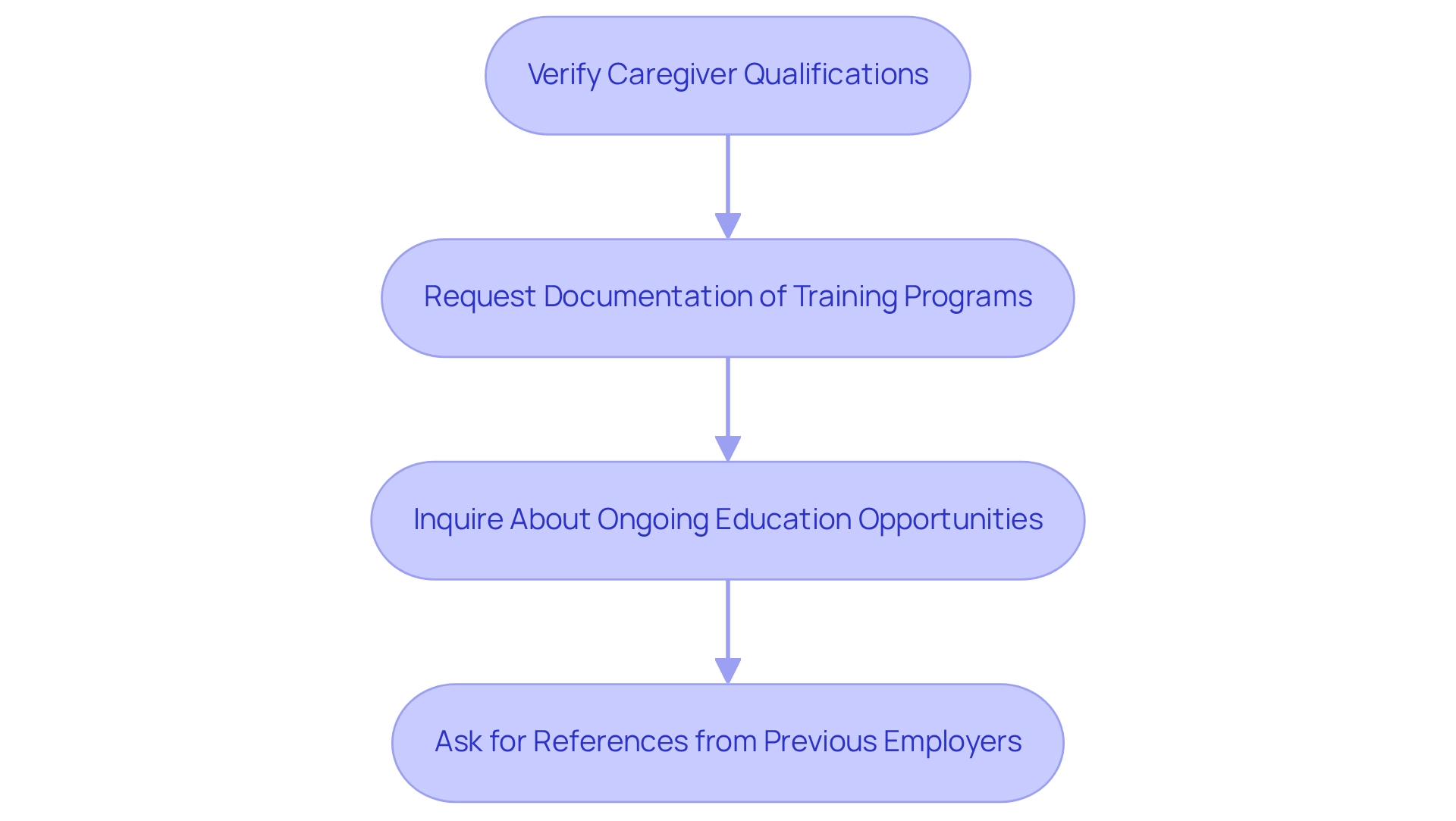
Read Reviews: Gather Insights from Current Residents and Their Families
Examining feedback from current residents and their families offers vital insights into the quality of care at senior care homes. Online platforms and community forums are filled with testimonials that highlight both positive experiences and areas that may require improvement. Families are encouraged to pay attention to recurring themes in this feedback, such as:
- Staff responsiveness
- Cleanliness
- The overall environment
Engaging directly with current residents and their families during visits can provide invaluable firsthand insights essential for making informed decisions in senior care homes. A recent study involving over 59,000 observations underscores the significance of online reviews in assessing service quality in assisted living facilities. This research reveals the reliability of evaluations, particularly from locations with at least five reviews, which can serve as a meaningful indicator of resident satisfaction. As Yunjiao Mao, an MS, noted, ‘This is the first study in the United States that used national data to assess the association between assisted living (AL) online ratings and residents’ home time.’ Testimonials from families often reflect their experiences, emphasizing both the emotional and practical aspects of care, which can greatly influence the choice of a facility. By focusing on these insights, families can confidently explore elderly care options, knowing that their loved ones’ comfort is a priority.
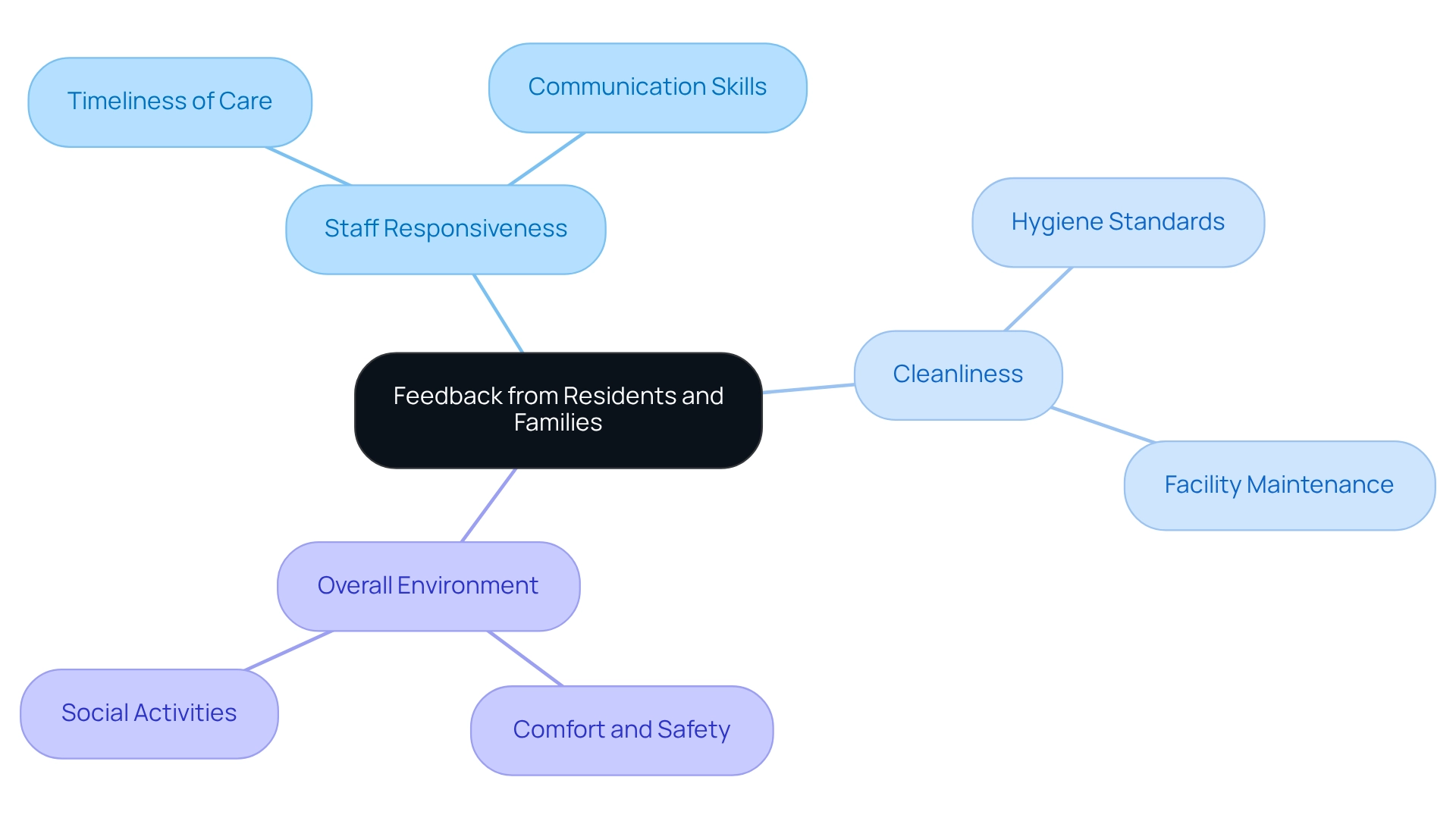
Review Policies: Understand the Rules and Regulations of Senior Care Homes
Understanding the regulations of senior care homes is crucial for families navigating the complexities of elder support. Key areas to focus on include:
- Admission criteria
- Discharge procedures
- Resident rights
These are foundational to ensuring quality care. Families should actively inquire about policies regarding:
- Medication management
- Emergency protocols
- Visitation rights
These elements significantly impact the well-being of their loved ones.
As the aging population continues to grow, with the typical resident of an assisted living facility being an 85-year-old woman, the demand for clear and effective policies becomes increasingly critical. In fact, healthcare costs for older adults are expected to increase significantly, highlighting the importance for relatives to be well-informed supporters for their loved ones. Comprehending the financial elements of elder support, including investigating insurance alternatives and community resources, is essential for households to make informed choices.
Moreover, understanding resident rights is paramount. Families should familiarize themselves with the regulations governing senior care homes, which are designed to protect residents and ensure their dignity. As mentioned by elder law lawyers, “It is crucial for relatives to understand their loved ones’ rights to guarantee they obtain the support they deserve.” This understanding enables households to interact with service providers assuredly and guarantees that the quality of assistance is maintained. By being proactive in comprehending these policies, households can better manage the challenges of elder support and advocate effectively for the needs of their loved ones.
To further assist households, it is advantageous to examine examples of optimal practices in elder support facility policies, such as:
- Regular staff training on resident rights
- Clear communication with households
Furthermore, comprehending the financial framework of elderly support is crucial; for example, total tax revenue from assisted living communities totals $9.5 billion, emphasizing the substantial investment in this sector.
As a practical suggestion, households should develop a list of inquiries to pose when examining policies in elder residences, guaranteeing they address all essential areas of concern.
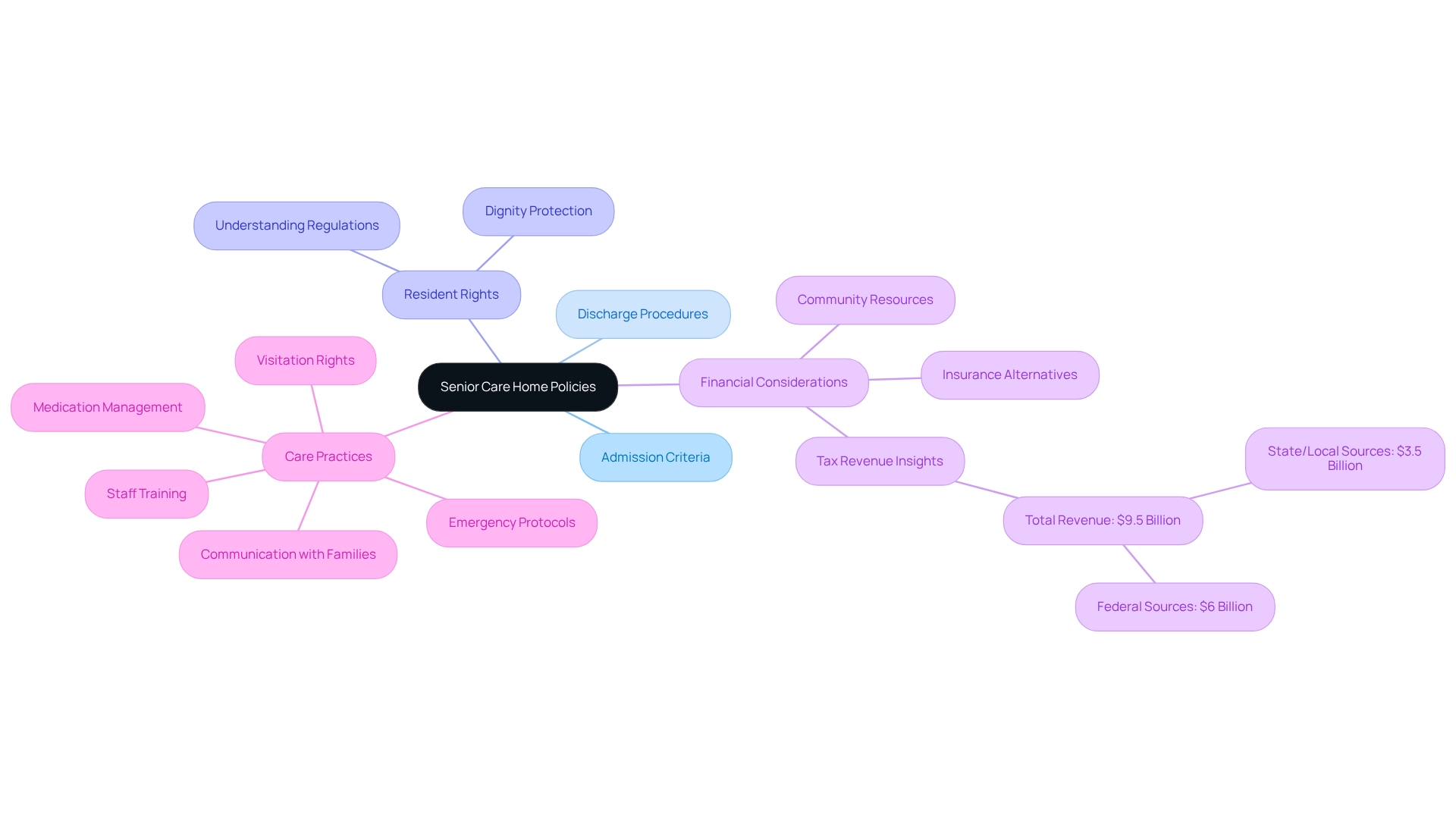
Explore Activities: Assess Social Engagement and Recreational Opportunities in Senior Living
Assessing the activities offered at senior care homes is essential for understanding how they promote social interaction and enhance overall well-being. Facilities that provide a diverse range of recreational opportunities—such as arts and crafts, exercise classes, and social outings—can significantly improve residents’ quality of life. Did you know that participation in leisure activities can increase healthy life expectancy by approximately two years for both genders? This underscores their vital role in promoting successful aging.
Engaging in these activities not only combats feelings of isolation but also fosters a sense of community among residents. Families, we encourage you to actively inquire about the variety and frequency of activities offered to ensure your loved ones have ample opportunities for social interaction. Furthermore, advocating for the implementation of evidence-based, long-term intervention programs with diverse activities can lead to improved mental and emotional health outcomes.
Evidence shows that organized recreational programs are crucial for enhancing the overall well-being of older adults. Therefore, it’s important for relatives to prioritize these factors when choosing a facility for elderly support. Remember, your comfort and the happiness of your loved ones are our priorities, and we’re here to support you in this journey.
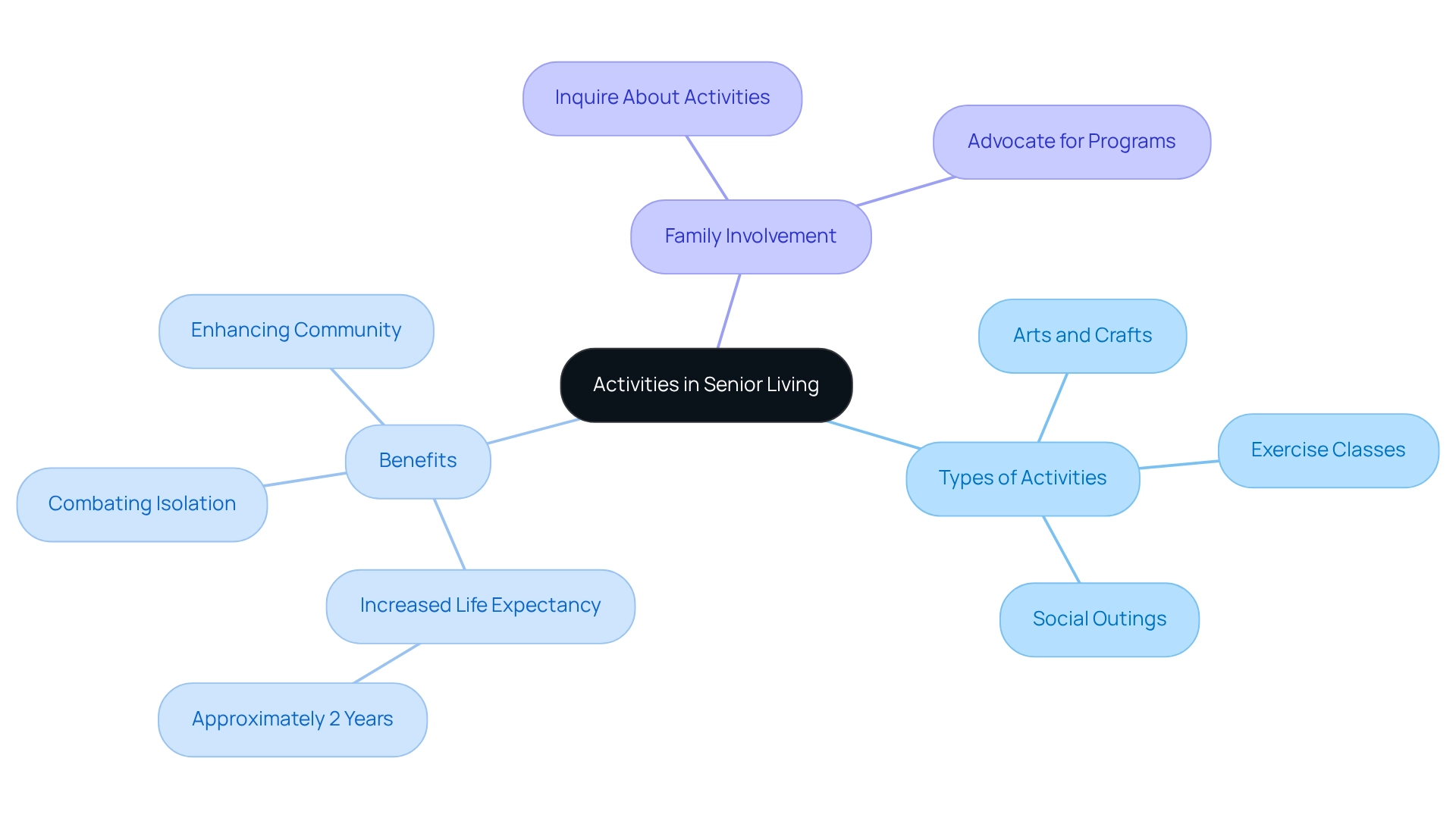
Build Trust: Ensure Compatibility Between Seniors and Caregivers for Optimal Care
Establishing confidence between elderly individuals and their caregivers is essential for providing the best support. Families must ensure that caregivers not only have the necessary qualifications but also share compatibility with their loved ones’ personalities and preferences. Research indicates that a strong relationship between caregivers and elderly individuals significantly enhances outcomes, as it fosters open communication and nurtures a sense of comfort. This supportive environment allows seniors to express their needs and concerns more freely, which is vital for their well-being.
Determining if an elderly relative requires CNA/HHA caregiver services involves assessing their ability to perform daily activities and their overall health status. Indicators that suggest the need for these services include:
- Difficulty with personal hygiene
- Dressing
- Cooking
- Cleaning
- Managing medications
Health issues, such as chronic conditions, frequent hospitalizations, or recent surgeries that necessitate ongoing support, are also crucial factors to consider. Statistics reveal that 31% of individuals receiving assistance who are not in assisted-living or skilled nursing facilities live alone, underscoring the necessity for caregivers who understand the unique circumstances of isolated seniors.
To promote compatibility, relatives should engage in conversations about their loved one’s preferences with the support facility. Observing interactions during visits can provide valuable insights into the dynamics between the caregiver and the senior. For instance, successful caregiver-resident relationships often stem from shared interests and mutual respect, which can be identified through these interactions. Best Care Nurses Registry exemplifies this commitment to compatibility, ensuring caregiver matches that align with clients’ needs. By prioritizing caregiver compatibility, families can build a foundation of trust that is crucial for ensuring high-quality support for their loved ones.
Additionally, maintaining open communication with the caregiver and the home care agency is important for ensuring quality care. Regular check-ins and feedback can help address any issues promptly. As noted by the National Alliance for Caregiving and AARP, the number of hours dedicated to caregiving increases with the age of the caregiver, further emphasizing the importance of establishing trust in these relationships. By taking practical steps, such as asking specific questions about caregivers’ experiences and values, families can enhance the likelihood of a successful caregiver-senior rapport. Furthermore, understanding the differences in training between CNAs and HHAs—where CNAs receive more extensive training focused on medical tasks while HHAs concentrate on personal care—can help families make informed decisions about the type of caregiver needed.
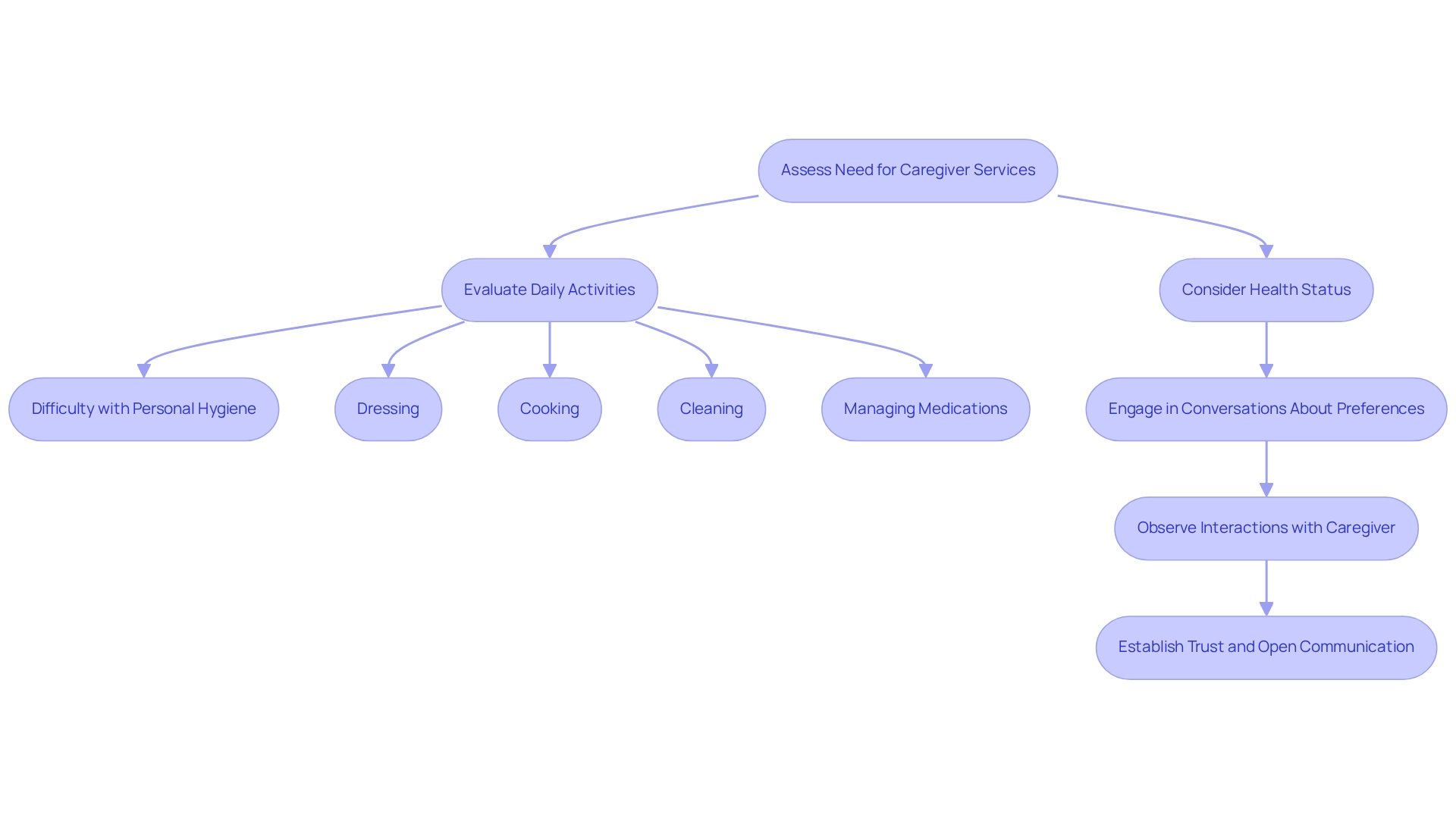
Conclusion
Selecting the right senior care option is a vital process that significantly impacts the quality of life for your loved ones. It’s essential to emphasize personalized care, as individualized care plans cater to specific needs and preferences, ultimately enhancing the living experience. Proximity to family and friends further enriches emotional well-being, reminding us of the importance of familial connections in caregiving.
Evaluating the services offered by senior facilities enables families to adapt to changing health needs effectively. Understanding financial implications and exploring insurance options are crucial steps in navigating elder care costs. Visiting facilities provides valuable insights into the care environment, while checking staff credentials ensures that caregivers are qualified to meet residents’ diverse needs.
Reading reviews from current residents and their families offers valuable perspectives on care quality and satisfaction. Familiarizing yourself with the policies of senior care homes and assessing social engagement opportunities contribute to a supportive atmosphere that fosters overall well-being. Building trust and ensuring compatibility between seniors and caregivers are essential for optimal care outcomes.
By focusing on these key considerations, families can make informed decisions that enhance their loved ones’ quality of life and provide peace of mind throughout the caregiving journey. With the right knowledge and support, finding the ideal senior care option can lead to a compassionate and fulfilling living experience for seniors.
Frequently Asked Questions
What is the primary focus of Best Care Nurses Registry in senior care homes?
Best Care Nurses Registry prioritizes individualized support, ensuring that each resident’s unique needs and preferences are addressed for a more comfortable and enriching living experience.
How does personalized support affect health outcomes and resident satisfaction in senior care homes?
Tailored support improves health outcomes and boosts resident satisfaction, leading to a profound sense of belonging and reducing feelings of depression and anxiety.
What advantages do home health care services from Best Care Nurses Registry offer?
Home health care services are less expensive, more convenient, and equally effective as care in hospitals or nursing facilities, addressing safety concerns and providing emotional support to reduce loneliness.
Why is family involvement important in senior care homes?
Regular visits from relatives help reduce feelings of loneliness and isolation, foster emotional support, and enhance overall satisfaction with support services, as family members become more involved in decision-making.
What is the process for creating a customized support plan with Best Care Nurses Registry?
The process begins with a call to discuss needs, followed by collaboration with the loved one’s physician to create a customized support plan and referring compassionate caregivers who align with the resident’s preferences.
What types of services should families consider when choosing senior care homes?
Families should consider a variety of services, including assistance with daily activities, medical care, and specialized programs for conditions like dementia, to ensure continuity of support as health needs evolve.
What is the significance of having diverse support services in senior care homes?
Facilities with a range of services can adapt more effectively to changes in health status, ensuring that residents receive appropriate support throughout their aging journey.
What role do CNA/HHA caregiver services play in senior care?
CNA/HHA caregiver services assist with personal hygiene and mobility while also providing emotional support, which helps alleviate feelings of loneliness and depression among residents.











